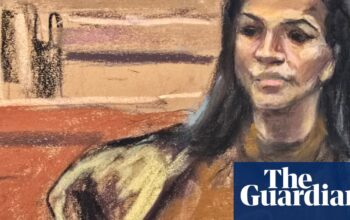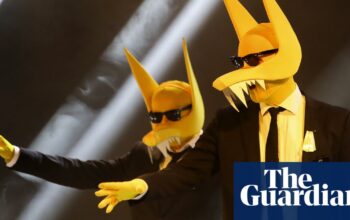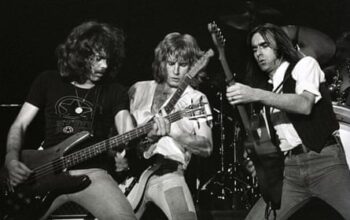On the club circuit in the 1960s, there was an unwritten rule about keyboards. The stages in most clubs were tiny, so whichever band was headlining got their choice of keyboard on stage first. If you were the support act – if, say, you were Reg Dwight, the keyboard player in a hard-working but minor band called Bluesology – you had to use whatever instrument the headliner used, because there was no room to set up your own gear.
My nightmare, which regularly came true, was arriving at the venue to find a Hammond organ on stage. The Hammond was an enormous, intimidating thing, like a chest of drawers with a keyboard attached. It had foot pedals and drawbars that changed its tone, and a huge speaker with a fan in front of it called a Leslie cabinet, which gave you a vibrato effect. I didn’t know how to work any of it. It felt like being at the controls of a spacecraft: a spacecraft that I had absolutely no idea how to fly.
I started thinking about the Hammond organ the other day, after Zoot Money died. He was one of those people who knew exactly what to do with it, who could make it growl and soar and sing. His death didn’t pass unnoticed but the coverage didn’t really reflect what a big deal Zoot Money’s Big Roll Band were in the 60s. They were a huge draw in the clubs: mods loved them. After he died, I listened to their version of The Cat, an old soul-jazz instrumental by Jimmy Smith that was a real standard on the club scene at the time: everyone played it, Bluesology included. We did it so often that, without thinking, I started miming along to it, playing the melody line with my right hand on the dining table. It must be nearly 60 years since I performed that song live, and I still remembered how to play it. But I couldn’t play it the way Zoot Money did, then or now. He was something special.
The club scene in Britain back then was full of special keyboard players – but Steve Winwood aside, none of them are really household names these days. It’s funny: there’s still a lot of reverence for the guitar heroes that British rock produced in the 60s – Eric Clapton, Jeff Beck, Jimmy Page – but the keyboard heroes, my heroes, not so much. I think that’s unfair – these were incredible, innovative musicians.

The first two I noticed were on stage at the Harrow Weald Social Club, which was quite the hot local venue when I was a teenager. Most of the bands I saw there were guitar based – the Big Three, the Merseybeats, the Kinks, Cliff Bennett and the Rebel Rousers – but the Animals’ Alan Price and Gary Brooker from the Paramounts were integral to their bands’ sound. I couldn’t take my eyes off them. Gary Brooker was playing an electric piano, something I’d never seen before, and Alan Price was hunched over a Vox Continental organ, getting the most incredible sounds out of it. When you heard him play that solo on House of the Rising Sun live, you really knew about it.
After that, I realised incredible keyboard players were everywhere: not just Zoot Money but Georgie Fame, Brian Auger, Graham Bond, Rod Argent. They were all doing something different with the keyboards; each of them had their own personality. Zoot Money was fun, a great showman: if you went to see the Big Roll Band at Klooks Kleek in West Hampstead, you knew you were in for a party. Georgie Fame was the epitome of cool: influenced by Mose Allison, hip to ska when its British audience was still largely confined to the West Indian community, always in a super-sharp Ivy League suit. Blossom Dearie even wrote a song about him: “Pop songs I hear with suspicion […] yet I’m impressed, my ears are blessed with Georgie Fame”.
Graham Bond was the musician’s musician, more in a jazz vein, technically incredible, with an insane band – a supergroup before anyone knew what a supergroup was. The rhythm section was Jack Bruce and Ginger Baker, who went on to form Cream; the guitarist was John McLaughlin, who subsequently played with Miles Davis. Rod Argent was the engine room of the Zombies. He wrote She’s Not There and his playing takes it to another level. It’s very English-sounding, very reserved and melancholy, then out of nowhere he plays this incredible solo that’s soulful but slightly classically influenced. It both fits the song perfectly and takes it somewhere else.
Brian Auger was just astonishing. His band Steampacket, with Julie Driscoll and Rod Stewart on vocals, backed Long John Baldry until they broke up and Bluesology got the gig. I remember thinking: “Oh God, what a step down for John – he had Brian Auger, now he’s got me.” And there was Stevie Winwood, who most people think of these days as a singer-songwriter – and fair enough, he’s a great songwriter – but who was like a Hammond-playing prodigy in the 60s: listen to his playing on the Spencer Davis Group’s Gimme Some Lovin’, which Charlie Watts once told me had the greatest intro to a record ever. Stevie was still a teenager when he did that.

I can understand why Steve Winwood was the only one to reach household-name status. For one thing, playing the keyboard is never as cool as playing the guitar. You can be a showman playing keyboards (Don Shinn, who played with the Soul Agents, used to rock his Hammond organ back and forth and jam screwdrivers into the keyboard: he was a huge influence on Keith Emerson’s performance style) but you can’t move around the stage, you’re off somewhere at the side, not out front. Ian Stewart is the ultimate example of that: a brilliant player, an integral part of the Rolling Stones’ sound – you can hear how great he was on Honky Tonk Women or Brown Sugar – but he played in the wings, not in front of the audience. Neither he nor his keyboard were deemed sexy enough for the Rolling Stones.
And a lot of them were live artists first and recording artists second. Their records are great, but they often don’t quite capture how exciting they were on stage: you had to be there. Steampacket never even made a record, just some demos that got released after they broke up – they’re nothing like as good as they were live. Zoot Money and Graham Bond never had a hit single, but then I’m not sure they wanted that kind of commercial success. They were playing for the love of the instrument, not to get on Top of the Pops, and that was part of their appeal. They were like a secret society for those in the know, a musical underground before anybody talked about underground music.
And as the decade progressed, keyboard players progressed too, away from their soul-jazz roots. We think of heavy rock as a guitarist’s art, but in Deep Purple, Jon Lord was experimenting with distortion to give the organ a sound as hard-driving as the guitars. So did Rod Argent when the Zombies broke up and he started Argent. Gary Brooker left the Paramounts, abandoned his electric piano, formed Procol Harum and made A Whiter Shade of Pale, a record that sounded like nothing anyone had heard before. In the Small Faces, Ian McLagan changed and adapted a rhythm and blues style of playing until it perfectly fitted the psychedelic era: it’s him that’s really driving Itchycoo Park or the title track of Ogdens’ Nut Gone Flake. Keith Emerson was bringing his training as a classical musician to bear on the sound of the Nice: it was the start of progressive rock. And Rick Wakeman seemed to come out of nowhere: he’d only just left the Royal College of Music when he played that amazing Mellotron part on David Bowie’s Space Oddity.

Some of these artists are better-known than others in 2024, and none of them are completely forgotten, but I think they deserve more recognition and applause than they get, and to have the spotlight turned on them. They were innovative and important and influential.
They certainly influenced me, precisely because I couldn’t do any of the things they did. I bought a Vox Continental but I couldn’t get the sounds out of it that Alan Price did, and my phobia of the Hammond never subsided. I was a piano player trying to play the organ like a piano, and it just doesn’t work that way – it’s a completely different technique, one I couldn’t master. So I decided to concentrate on the piano and writing songs. It was the right thing to do. A few years later, when we needed a Hammond organ sound on my album Madman Across the Water, I thought about it, then called Rick Wakeman. That was the right thing to do, too.
Source: theguardian.com


